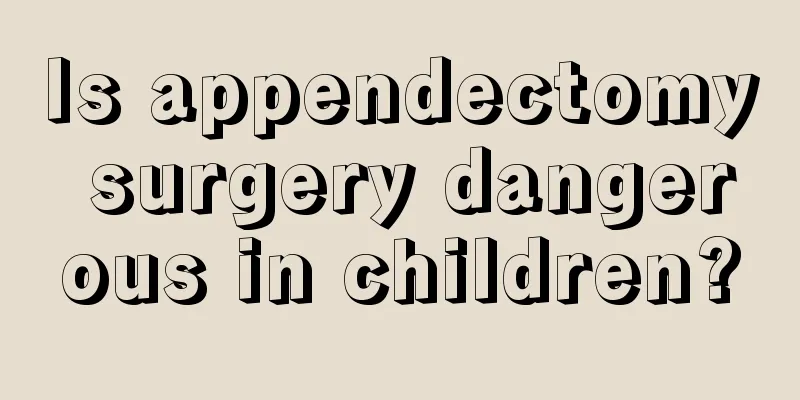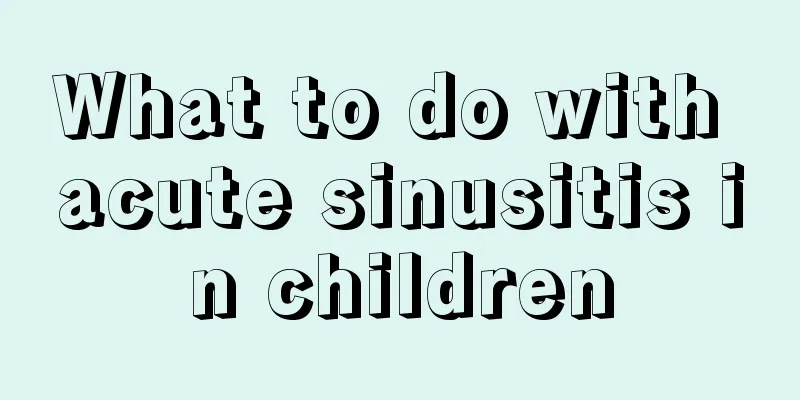Is appendectomy surgery dangerous in children?

|
Appendicitis is a common disease that occurs easily in people of all ages. This disease comes on suddenly and causes great harm to people's bodies. Generally, surgical removal is required. Many children also have appendicitis problems. As long as children's appendicitis is discovered in time, the problem is generally not serious. However, many people are still worried about the impact of surgery on their children. So is appendicitis surgery dangerous for children? 1. If a child suffers from appendicitis, surgery must be performed as soon as possible, otherwise perforation or even complications may occur. The operation does not have much risk, and most children recover well after the operation with basically no sequelae. The danger of surgery is mainly due to the fact that the patient is a child who does not have good self-control and may move around during the operation. Therefore, anesthesia must be done well before the operation, and the child's emotions must be calmed so as not to frighten the child. Choose a professional and reliable hospital for treatment. Since appendicitis surgery is only a minor operation, it can basically be completed smoothly. The next thing to do is postoperative care. As long as the care is good, there will basically be no danger in the future. 2. Common postoperative sequelae include fifth-day syndrome, which refers to the sudden onset of abdominal pain and high fever 4 to 5 days after surgery (in some cases up to the 8th day), which develops into signs similar to diffuse peritonitis a few hours later. Therefore, the danger of appendectomy surgery in children is mostly not during the operation, but after the operation. In order to avoid these dangers, we must provide comprehensive postoperative care. When the operation is over, the child's lying position needs to be adjusted because the child has just received anesthesia. The adjusted position changes according to the position of anesthesia. For example, patients undergoing lumbar anesthesia should lie flat without a pillow for 6 to 12 hours to prevent leakage of cerebrospinal fluid and headaches. Patients under continuous epidural anesthesia can lie flat with a low pillow. In order to observe whether the child is out of danger, measure blood pressure and pulse once every hour for three consecutive times until they are stable. If the pulse speeds up or the blood pressure drops, bleeding may occur and the wound should be observed promptly and necessary measures should be taken. 3. Diet must also be strictly controlled. Children are not allowed to eat on the day of surgery. They can eat liquid food on the first day after the surgery, and soft food on the second day. They can start eating normal food three days after the surgery. You can get up and move around 24 hours after the operation to promote the recovery of intestinal peristalsis and prevent intestinal adhesions. At the same time, it can enhance blood circulation and accelerate wound healing. |
>>: Can children eat rock candy?
Recommend
What can cause precocious puberty?
Because they love their children very much, they ...
What to do if your child has a bad constitution
As economic life becomes more and more prosperous...
Is excessive exercise good for children?
Nowadays, many parents pay great attention to the...
What's going on when the baby shakes his head and scratches his ears?
I believe that careful mothers will often find th...
What is the reason why children always have runny noses?
Because the baby's body resistance is relativ...
What should I do if my child has a persistent high fever?
Parents must pay attention to children's pers...
Height standard for one month old baby
I don’t know if you know about the height of a on...
What are some foods that aid digestion for children?
Nowadays, many children have some indigestion pro...
What is wrong with children's stomach acid? There are many reasons
Children have weak constitutions and often show s...
What to do if your baby coughs after waking up
Children's bodies are relatively fragile, so ...
When is the best time for young children to brush their teeth?
Many times, first-time mothers wonder at what age...
Precautions for turning on air conditioning in the baby room
Because newborns have just arrived in a new envir...
What to do if the child's genitals are small
The size of people's penises varies, and the ...
At what months can babies crawl?
Many mothers observe their children's various...
Red pimples on the child's buttocks
The baby's skin is delicate, and the newborn ...









